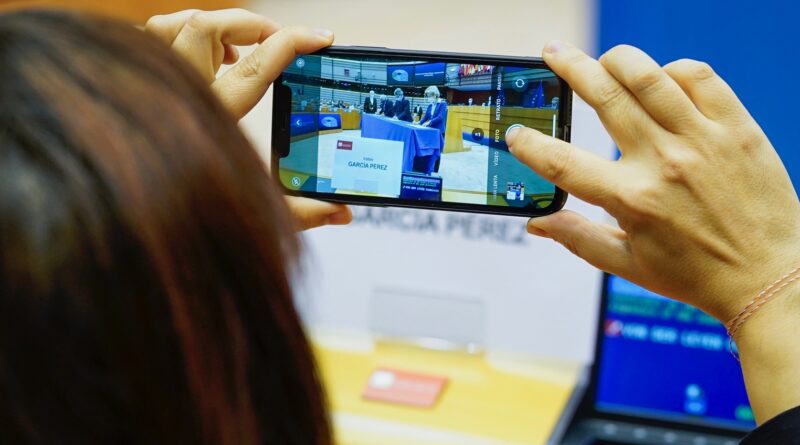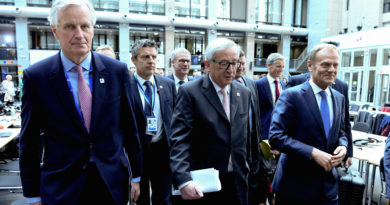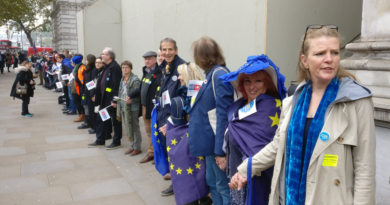How to participate in the Conference on the future of Europe?
After several delays, the Presidents of the European Parliament, the Council and the Commission signed on Wednesday 10 March a joint declaration launching the ‘Conference on the Future of Europe’. Through the Conference, they want citizens to “have their say” on the set up of the European Union and strengthen links with the EU institutions.
“European citizens from all walks of life and corners of the Union will be able to participate, with young Europeans playing a central role in shaping the future of the European project,” the declaration says.
How will that work? Assya Kavrakova, Executive Director of European Citizen Action Service (ECAS) in Brussels, one of the organisations involved in the Conference, has discussed the details with Europe Street News.
Why is the European Union organising this public consultation?
The Conference on the future of Europe is organised in response to the so called EU democratic deficit, which describes a gap between the European institutions and EU citizens. It is part of the programme of the current European Commission, as President Ursula von der Leyen has pledged a “new push for the European democracy.” In her opening speech at the European Parliament in July 2019, Ms von der Leyen promised she would listen to EU citizens and hear their concerns, their hopes and expectations through a Conference on the future of Europe.
Who got the idea?
The idea was first floated by French President Emmanuel Macron in March 2019, ahead of the European elections. The intention was to start the Conference in 2020 and present the results during the French Presidency of the Council of the EU, in the first half of 2022. Unfortunately the process was delayed due to the COVID-19 crisis, but not only. It took a long time for the Council, the Commission and the European Parliament to agree on the management of the Conference and on its leaders.
What is the purpose of the Conference?
The Conference on the Future of Europe aims to give Europeans a greater say on what the EU does and how it works for them. There are high expectations that citizens would be able to participate in deliberations on key policy issues as well as have a say on structural reforms, which would need to be agreed upon and implemented in order to make the Union more democratic. According to Vice President Dubravka Šuica, who is in charge of the Conference on behalf of the Commission, there should be “a new transparent debate” to bring citizens “into the heart of policy making.”
Which topics will be discussed?
What we know at the moment is that the topics will likely be based on the political priorities of the von der Leyen Commission. The joint declaration gives a non-exhaustive list of themes, mentioning health, climate change, social fairness, the digital transformation, the rule of law, the EU’s role in the world, and how to strengthen democratic processes governing the EU. Engaging citizens in new ways should also strengthen the citizenship right to participate in democratic life. EU citizenship rights could also be expanded. All rights related to environmental and social protection are already part of EU citizenship, although not explicitly mentioned, as they are not necessarily guaranteed elsewhere. If citizens support more EU competences in the health domain, this will enlarge the concept of EU citizenship adding more rights.
How long will the Conference last?
The initial idea was it would last two years. This will not be the case, as the Conference is supposed to be launched on 9 May 2021 and citizens’ inputs will be collected until spring 2022, when conclusions will be drawn. There are concerns that the time may prove insufficient to ensure a quality, inclusive, EU-wide and citizen-centric debate to match the ambitions announced by politicians and the expectations raised in society.
How many events will be organized?
The number of events is not known at this stage but the plan is to have physical gatherings or digital events at different levels, including national, transnational and regional level. At the European level, the EU institutions have committed to organise citizens’ panels and specific events dedicated to young people. Each member state can organise additional events, in line with their national or institutional specificities. Moreover, the institutions have committed to make available an interactive multilingual digital platform with information and possibilities for everyone to contribute.
Who is the organiser?
The Conference is under the authority of the three EU institutions – the Commission, the European Parliament and the Council – represented by their Presidents, acting as joint presidency. An executive board, equally representing the three institutions, will soon be constituted, with national parliaments having observer status. The executive board will oversee the works of the Conference, and prepare the Conference plenary meetings, including citizens’ input and their follow up.
It is worth mentioning that there will be parallel processes to the institutional one. For example, 75 civil society groups and national networks have joined forces to organise a Civil Society Convention on the Future of Europe (the website will be announced later) soliciting the input of civil society. ECAS will lead the deliberations on the digital transformation through its own online crowdsourcing platform, which is space to exchange ideas among people registered and to vote among suggestions. We aim to ensure the outcomes of the Convention feed into the Conference results.
How are participants in the Conference selected?
The European citizens’ panels will be composed of EU citizens randomly selected, but in a way that is representative of different geographic origins, gender, age, socioeconomic backgrounds and levels of education. As far as the other events are concerned, it will depend on the approach of each organiser.
If a person is not selected but wants to have a say, what can they do?
The European Commission has committed to set up a multilingual website where every EU citizen can have a say, discuss and provide ideas in their mother tongue. As the platform is not available yet, it is difficult to say how it will work and how the debates will be structured. [The website to share views and ideas on the future of Europe was announced on April 19: https://futureu.europa.eu/?locale=en.]
Another way of participating would be through civil society organisations, such as those involved in the Convention.
Are people supposed to participate in their own country, or can they join a conference elsewhere?
Both will be possible. There will be European panels but each member state can organise additional panels or other form of events to include citizens residing on their territory. The multilingual platform will allow people to participate digitally, regardless of where they reside.
Is the Conference open only to EU citizens or can also non-EU citizens, both within and outside the EU, take part?
This is a very good question, the answer to which is not clear yet. It seems that the institutions aim to involve only EU citizens. Civil society organisations, however, consider this a very short-sighted approach and will definitely take measures to remedy the situation. The Civil Society Convention will engage beyond the EU.
What about EU citizens who live outside the EU?
They could use the online platform to contribute, and participate in online deliberations organised by civil society organisations or other stakeholders.
How is the pandemic affecting the event?
The pandemic delayed the start of the Conference by one year, but highlighted the need of solid digital engagement, including through the multilingual online platform. There is still a commitment to physical participation and face-to-face exchanges, but the concrete operations will depend on the health situation. Moreover, health as a topic now appears frequently in discussions on “what the conference is about”. More EU competences in the health domain would not have been so high up on the agenda without the pandemic.
What will be the outcome of this process?
Contributions and ideas should provide guidance on the future of the EU and the recommendations will be consolidated into a “report to the joint presidency” to be delivered during the French Presidency in 2022. There is no commitment to make the outcomes binding and it is not clear at this stage how inputs will be taken on board by decision-makers. There are mixed messages when it comes to the possibility of changing the EU Treaty. The Council in February explicitly said that the Conference does not fall within the scope of the Treaty. But the European Parliament seems open to the idea if this is what citizens want. The joint declaration does not mention Treaty changes.
What are the chances the proposals will be really taken forward?
As always, it will depend on the political will of both the EU decision-makers, but also the national governments. In a number of occasions in recent years, the Commission has put forward bold policy proposals, watered down afterwards by the Council, which is the expression of national governments. This has happened for instance during the refugee crisis, the debate on the posting on workers in other EU states, and the link of EU funds with the rule of law. With high expectations raised on this Conference, politicians will need to deliver on the results, but this may not happen immediately considering the complexity of EU decision-making. Hopefully civil society will closely monitor the process and push for citizens’ proposals in future advocacy efforts beyond the Conference. One things is sure: citizens need to be provided with clear feedback on which proposals will be taken on board and which will not, and why. If this is not done, the entire democratic exercise will risk backfiring and widening rather than closing the gap between the EU and its citizens.
Where can people follow the debate?
Through the institutional websites for general information, the multilingual platform for concrete discussions and proposals, and through social media. The European citizens’ panels organised at European level will be broadcast, the online submissions and the relevant documents will be made available on the platform. Moreover organisations like ECAS will report on the progress and provide analysis on a regular basis.
Claudia Delpero © Europe Street News
The article was updates on April 19 with the online citizens’ platform https://futureu.europa.eu/?locale=en. Photo by Daina Le Lardic, Copyright © European Union 2021 – Source : EP.
Europe Street News is an online magazine covering citizens’ rights in the EU and the UK. We are fully independent and we are committed to providing factual, accurate and reliable information. We believe citizens’ rights are at the core of democracy and information about these topics should be accessible to all. This is why our website and newsletter are available for free. A lot of research is behind every article, so if you found this useful, please consider making a contribution so we can continue and expand our coverage. Thank you!




